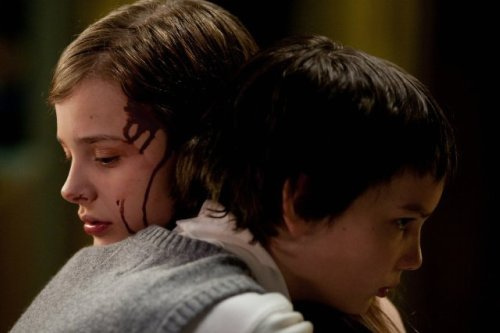Fantastic Fest Review: Let Me In

When it was announced that the Swedish horror film Let the Right One In would be remade for American audiences, many responses were skeptical. The selection of Matt Reeves as director for Let Me In left fans and film critics conflicted. Cloverfield had such a distinct cinematographic style that many folks were left wondering if Reeves could possibly stay true to the spirit of John Ajvide Lindqvist's novel on which the films are based, as well as meet the bar set by director Tomas Alfredson and Lindqvist's original screenplay. Let the Right One In was so compelling that I immediately followed up by enjoying the book, so my expectations for Let Me In -- this year's Fantastic Fest opening-night film -- were not very high. However, Reeves has delivered a worthy homage to the original movie while adding more emotion to the lead characters.
Let Me In focuses on Owen (Kodi Smit-McPhee), a stereotypical young 98-pound weakling. The school bullies terrorize him on a daily basis, and the only person he could possibly confide in is his mother (Cara Buono) who drinks herself into a stupor every night. Instead he lies about injuries suffered at the hands of his attackers as he is subjected to public humilation.
When Abby (Chloe Moretz) moves in next door with her guardian, Owen befriends her despite her protestations. We quickly learn that she must consume blood to live, and that her guardian "Father" (Richard Jenkins) is charged with the precarious task of finding fresh blood sources on a regular basis. Father gets sloppy, and a frenzied Abby takes matters into her own hands, which jeopardizes their new home. Meanwhile Abby encourages Owen to stand up for himself and fight back. Although he succeeds in turning the tables on his tormentors, it backfires by making him the target of the head bully's older brother in a supernatural climax reminiscent of Carrie.
The core plot of Let Me In is the same as its source material, but subplots and secondary characters that were instrumental to giving the novel depth are glaringly absent or not thoroughly developed. The characters are there, but are presented in a mostly voyeuristic manner, reminiscent of Alfred Hitchcock's Rear Window. This issue prevents viewers from emotionally investing in any characters other than Owen and Abby. However, Reeves uses this opportunity to develop the relationship between Owen and Abby so well that irst and foremost, this film is a love story. There's plenty of horror and mystery, but those themes are not as intent.
Let Me In gains a lot of strength from its cast, especially young actors Smit-McPhee and Moretz. For a film with sensitive topics and graphic in nature, these two actors turned in solid professional performances. Sadly Richard Jenkins and Elias Koteas, who plays a policeman, were under-utilized, and we barely see the lovely and talented Cara Buono.
The cinematography and musical score in Let Me In is excellent, with atmosphere and tones straight out of the original film adaptation. The set design of the courtyard with its playscape seemed to be an exact replica of the original film's location.
Let Me In endears viewers as we witness a lonely young boy finding courage and strength through his friendship and love with an immortal young vampire is. Don't be mistaken -- there are several adult topics involved in this film, and therefore it's not for fans of shiny vampires, but of creatures that must and do prey on humans to survive. I highly recommend seeing Let Me In on the big screen so you'll feel immersed in the bleak and cold scenery of this film.


Since you read the book and saw the original movie.
You weren't bothered with what they made Jenkins' character in this movie?